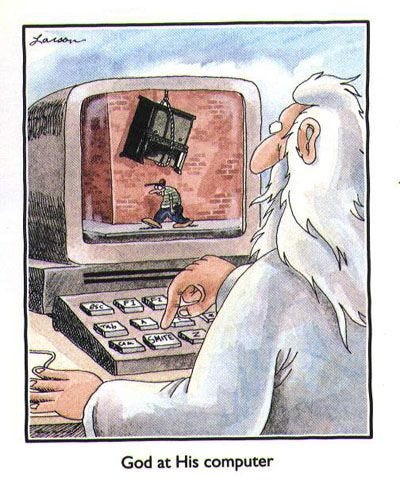Our mindful maker.
God the Father never relinquishes his grip on us.

When you think about God, what comes to mind? What’s the first idea, character trait, or personality that you imagine? What’s the first thing that pops into your head? For most, “God” is not really a reality at all, he’s more of an idea. He’s the ethereal character that brings guidance to cloudy situations, the mysterious being that people pray to when their grandma’s in the hospital, the metaphysical culmination of all our desires. For others, God is much different. He’s a mean old man who continues to dole out raw deals and short straws. He’s the grumpy grandfather of the trinity who seems to only have your grief in mind. Many imagine him much like this:
Sad but true in many cases. But that’s not like God at all. He’s not some tortuous old man bent on seeing you suffer. He’s a real person who desires to bring you to repentance and, therefore, into a relationship. He’s not only a real person, He’s a person who’s for you — a Father who knows you!
Perhaps the most remarkable thing about God is that he’s “mindful of us” — that is, he’s personable. While God is the infinite Creator and supreme Ruler of all the worlds and galaxies and solar systems that exist, he’s also your Father. He’s intimately aware of both the distant erupting stars and the instant his children are distressed. He is, as Steve Brown says, the God of bald heads, dead sparrows, and the eternal verities of the Christian faith (Matt. 16:29–31). Indeed, the most amazing thing about God is that while he sustains the whole universe in the palm of his hand, he’s also personally interested in you as well. He’s concerned for you and your troubles and trials. All the things that upset us grieve him too. All our sufferings are felt by him, by his Son (Heb. 4:15). You see, maybe the most incredible miracle of all is that God is “mindful” of us, acquainted with us, and purposeful for us. This thought completely bewildered the psalmist, as he exclaims:
When I look at your heavens, the work of your fingers, the moon and the stars, which you have set in place, what is man that you are mindful of him, and the son of man that you care for him? (Ps. 8:3–4)
It seems odd, doesn’t it, that we who are so insignificant in this universe are considered so highly by he who rules the universe. What’s in man that allows for so much heavenly notice? Why is he the subject of so much divine interest? Discovery after discovery in modern astronomy should only serve to conjure thoughts like these. What about mankind should attract the attention and care of the Father? Our lives are fleeting, like minuscule dots in the order of history, and yet those dots stoke the flames of the Father’s compassion. How is it that amidst the vast array of stars and planets and galaxies, we could be of such consequence to him? David was struck by questions like these with only the knowledge of a promised Deliverer. How much more force ought these questions to have on us who know of a presented Savior? The psalmist read of what the Messiah would do, we’ve read of what he’s done. He read, “He will do it,” we read, “It is finished.”
And so it is that we must be enraptured by the thought, Why did divinity manifest in humanity? You see, because beyond just notice, we’ve been visited by him. “What is man, that thou art mindful of him? and the son of man, that thou visitest him?” (Ps. 8:4 KJV). God doesn’t just see you, he sojourns with you. Jesus is God in the flesh, his heavenly Visitor, the epitome of all God’s thoughts towards you. He’s the mindfulness of God, the Attender of the weak, and the Savior of the lost.
Jesus is the expression and embodiment of our Father’s mind. Jesus is God thinking, God loving, God working, God redeeming. (Winslow, 118)
When you really think about it, God should’ve had nothing to do with us. We, his prized creation (Ps. 8:5–8), have rejected him and rebelled against him. We’ve forged our own wayward course and ran from the Father’s side. Left to our own devices, we want nothing to do with him. God would’ve been just and righteous in casting us aside forever, throwing us into oblivion, and starting over. But he didn’t. God’s love impelled him to not only sustain his creation but enter it as well. God in Christ has become one of us so that we could be like him. The ever-mindful God entertains our wanton rebellion so that his gracious redemption might be seen as all the more glorious.
Pride and conceit fall away in an instant the moment we meditate on our mindful Maker — on the Creator God whose infinity transcends all human comprehension and yet whose tender mercy and patience are just as infinite. There’s not a moment when he’s not thinking of you. Though we waver and relax our grip on him, God the Father never relinquishes his grip on us. Nor are we ever outside of his care. Whenever you’re tempted to be discouraged or depressed, to give into despair, just remember that you have a God who’s mindful of you and is uniquely concerned for you. You have a Father who’s so bent on redeeming and reclaiming his own that he sent his own Son on your behalf.
If you’re left wondering how far God will go to save you, just remember Golgotha’s bloody scene. If you’re curious as to the lengths of his love, just remember the cross. If you’re ever doubting or questioning God’s disposition towards you, just remember your mindful Maker.
Works cited:
Octavius Winslow, The Precious Things of God (New York: Robert Carter & Bros., 1867).



